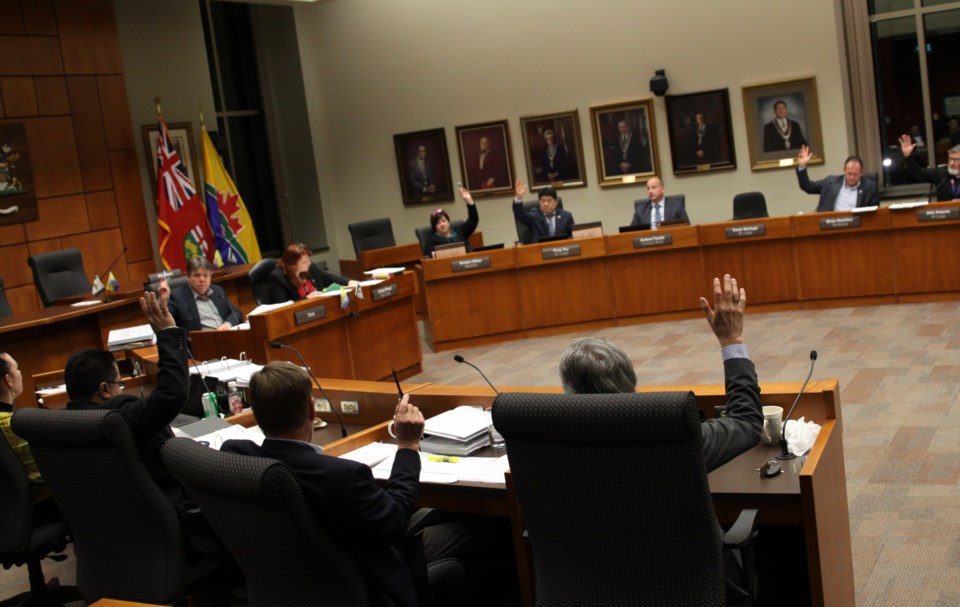THUNDER BAY – With well under a year left before its term expires, Thunder Bay’s city council has approved a report from administration indicating progress on its priorities will be delayed due to the COVID-19 pandemic.
That will mean decisions on some outstanding issues will instead be made by the next council after the Oct. 24 municipal election, acknowledged numerous city councillors who spoke with TBNewswatch.
Councillors expressed confidence that major strategic priorities like a renewed zoning bylaw and reorganization of the bylaw enforcement division will be finalized before the current term ends, however.
The work of council will largely come to a halt in June, with less frequent meetings continuing through September, said Coun. Rebecca Johnson. That leaves a limited runway to tackle the 41 items currently on the outstanding list and due to return to council in 2022.
“Some stuff will get bumped [to the next term], no doubt,” said Coun. Brian Hamilton.
Items on the outstanding list include implementation of master plans for EMS and fire services, potential changes to bylaws governing yard maintenance, property standards, and signs, a decision on whether to put cameras on local school buses, developing an expanded homelessness and poverty strategy, and a report on a potential nuisance bylaw.
The list also features more mundane items like a new line-painting standard for city trails.
Deadlines on some of the items had been pushed back before due to the pandemic, and other issues.
City administration warned council at a Monday meeting that progress on outstanding items would slow, primarily thanks to the Omicron variant. Council authorized the deferral of all outstanding items by up to two months, and gave staff more leeway to prioritize the work it does to support council committees.
“Omicron is different,” city manager Norm Gale wrote in a memo, “and we are preparing for the highest levels of staffing shortages in the workplace that we have ever seen.”
The city is assuming at least six to eight weeks of significant disruptions “as Omicron infects most of the population,” Gale indicated.
That could cause delays in reporting back on the outstanding council items, many of which Gale called “important” but “not legislated or essential."
Some city councillors were more blunt, suggesting colleagues had too often brought forward issues that were either peripheral or outside of the city’s jurisdiction.
“In the last, I’d say 18 months to two years, councillors have just been constantly piling on resolutions,” said Johnson. She sees a need for council to prioritize its asks of administration to ensure more important work is completed first.
Coun. Shelby Ch’ng referenced the new bylaw regulating stray shopping carts as one example of motions she believes have eaten up staff time and distracted from core priorities.
The move in recent months to update council regularly with a list of outstanding items with report-back dates has been a step in the right direction, she said.
Coun. Andrew Foulds said he respected each councillor has their own priorities – “that’s a good thing,” he said – but acknowledged the problem.
“I do think some of the resolutions that have come forward have been redundant and perhaps outside of our lane as a municipality,” he said.
“Members of council bring many great ideas for programs, services, restructuring, and policy work to administration,” Gale wrote in his memo, but advised councillors’ proposals “need to be scaled back where possible” during the pandemic.
In the short term, Gale said the city will put a priority on maintaining essential operations including transit, emergency services, and long-term care, as well as legislative requirements like finalizing the 2022 budget and 2021 year-end financial statements, and preparing for the municipal election.
Administration will also keep moving forward “key council strategic priorities” like the revitalization of downtown Fort William, restructuring of the bylaw enforcement division, passage of a new zoning bylaw, and the potential indoor turf facility, Gale indicated.
Councillors were broadly understanding of the need to push back the deadlines.
Like everyone, said Coun. Andrew Foulds, city staff are tired.
“I think our bureaucracy is working extraordinarily hard,” he said. “The last two years in the pandemic, our staff has had to pivot from one decision to another.”
“I do think we need to manage expectations,” he added, “so we can all stay healthy and mentally well.”
Along with Omicron, Gale’s memo identified overall burnout as a contributing factor to delays, saying “city staff at all levels are experiencing pandemic-related fatigue.”
“Current workloads for staff are unsustainable and we must take an adaptive approach in ensuring the long term health and well-being of the people who work here,” he wrote.
Coun. Mark Bentz was less than alarmed at the potential delays to outstanding items.
“I think critical stuff will get dealt with,” he said, while other work may have to be picked up by the next council.
Most councillors agreed they were less concerned with items on the outstanding list, and more focused on the 2022 budget, new zoning bylaw, and overhaul of the enforcement division.
